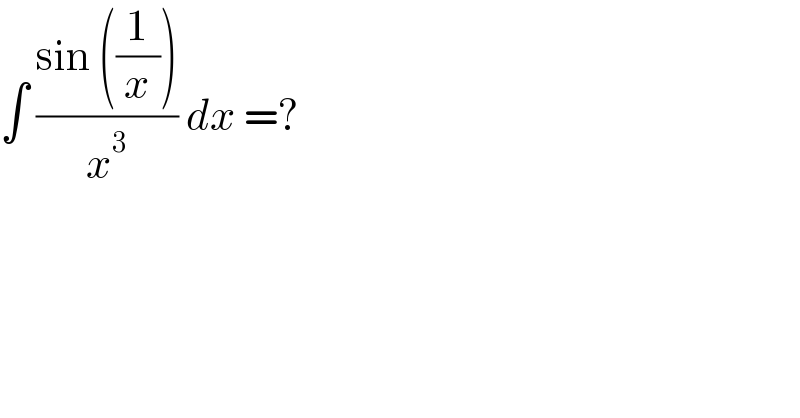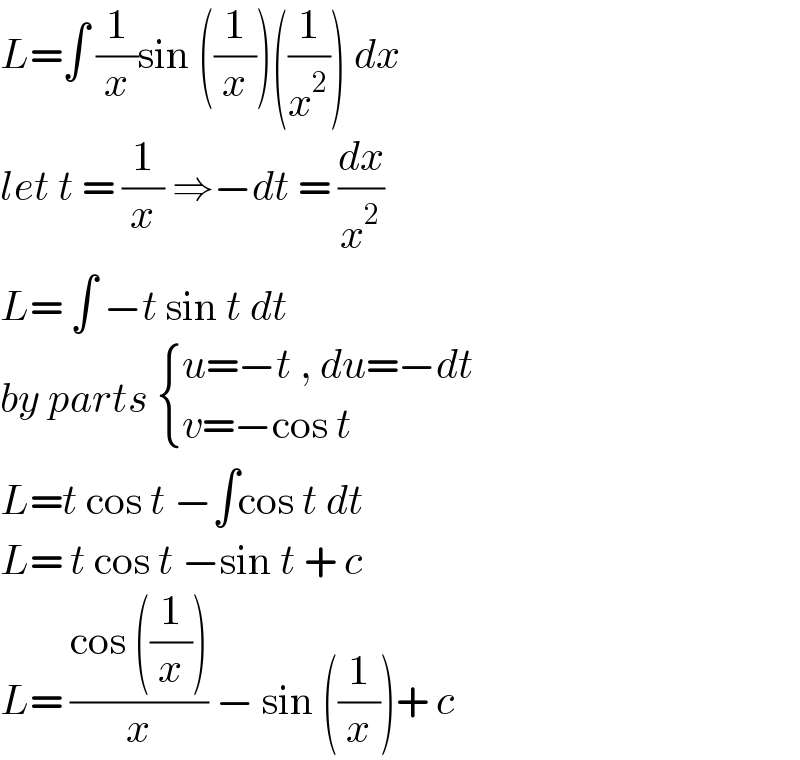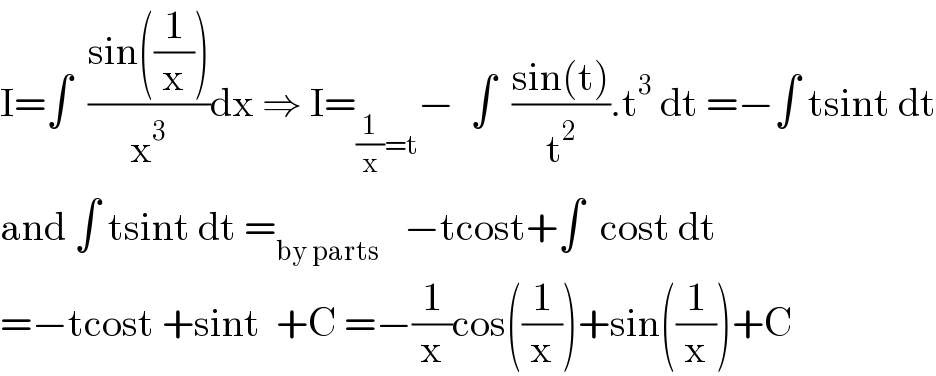
Question Number 137508 by EDWIN88 last updated on 03/Apr/21

$$\int\:\frac{\mathrm{sin}\:\left(\frac{\mathrm{1}}{{x}}\right)}{{x}^{\mathrm{3}} }\:{dx}\:=? \\ $$
Answered by liberty last updated on 03/Apr/21

$${L}=\int\:\frac{\mathrm{1}}{{x}}\mathrm{sin}\:\left(\frac{\mathrm{1}}{{x}}\right)\left(\frac{\mathrm{1}}{{x}^{\mathrm{2}} }\right)\:{dx} \\ $$$${let}\:{t}\:=\:\frac{\mathrm{1}}{{x}}\:\Rightarrow−{dt}\:=\:\frac{{dx}}{{x}^{\mathrm{2}} } \\ $$$${L}=\:\int\:−{t}\:\mathrm{sin}\:{t}\:{dt}\: \\ $$$${by}\:{parts}\:\begin{cases}{{u}=−{t}\:,\:{du}=−{dt}}\\{{v}=−\mathrm{cos}\:{t}}\end{cases} \\ $$$${L}={t}\:\mathrm{cos}\:{t}\:−\int\mathrm{cos}\:{t}\:{dt}\: \\ $$$${L}=\:{t}\:\mathrm{cos}\:{t}\:−\mathrm{sin}\:{t}\:+\:{c} \\ $$$${L}=\:\frac{\mathrm{cos}\:\left(\frac{\mathrm{1}}{{x}}\right)}{{x}}\:−\:\mathrm{sin}\:\left(\frac{\mathrm{1}}{{x}}\right)+\:{c} \\ $$
Answered by mathmax by abdo last updated on 03/Apr/21

$$\mathrm{I}=\int\:\:\frac{\mathrm{sin}\left(\frac{\mathrm{1}}{\mathrm{x}}\right)}{\mathrm{x}^{\mathrm{3}} }\mathrm{dx}\:\Rightarrow\:\mathrm{I}=_{\frac{\mathrm{1}}{\mathrm{x}}=\mathrm{t}} −\:\:\int\:\:\frac{\mathrm{sin}\left(\mathrm{t}\right)}{\mathrm{t}^{\mathrm{2}} }.\mathrm{t}^{\mathrm{3}} \:\mathrm{dt}\:=−\int\:\mathrm{tsint}\:\mathrm{dt} \\ $$$$\mathrm{and}\:\int\:\mathrm{tsint}\:\mathrm{dt}\:=_{\mathrm{by}\:\mathrm{parts}} \:\:\:−\mathrm{tcost}+\int\:\:\mathrm{cost}\:\mathrm{dt} \\ $$$$=−\mathrm{tcost}\:+\mathrm{sint}\:\:+\mathrm{C}\:=−\frac{\mathrm{1}}{\mathrm{x}}\mathrm{cos}\left(\frac{\mathrm{1}}{\mathrm{x}}\right)+\mathrm{sin}\left(\frac{\mathrm{1}}{\mathrm{x}}\right)+\mathrm{C} \\ $$
Commented by mathmax by abdo last updated on 03/Apr/21

$$\Rightarrow\mathrm{I}\:=\frac{\mathrm{1}}{\mathrm{x}}\mathrm{cos}\left(\frac{\mathrm{1}}{\mathrm{x}}\right)−\mathrm{sin}\left(\frac{\mathrm{1}}{\mathrm{x}}\right)+\mathrm{C} \\ $$
